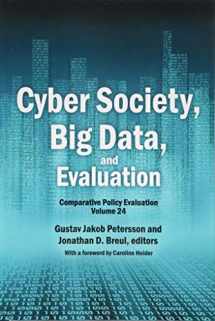
Cyber Society, Big Data, and Evaluation: Comparative Policy Evaluation
Book details
Summary
Description
We are living in a cyber society. Mobile devices, social media, the Internet, crime cameras, and other diverse sources can be pulled together to form massive datasets, known as big data, which make it possible to learn things we could not begin to comprehend otherwise. While private companies are using this macroscopic tool, policy-makers and evaluators have been slower to adopt big data to make and evaluate public policy. Cyber Society, Big Data, and Evaluation shows ways big data is now being used in policy evaluation and discusses how it will transform the role of evaluators in the future. Arguing that big data will play a permanent and growing role in policy evaluation, especially since results may be delivered almost in real time, the contributors declare that the evaluation community must rise to the challenge or risk being marginalized. This volume suggests that evaluators must redefine their tools in relation to big data, obtain competencies necessary to work with it, and collaborate with professionals already experienced in using big data. By adding evaluators' expertise, for example, in theory- driven evaluation, using repositories, making value judgements, and applying findings, policy-makers and evaluators can come to make better-informed decisions and policies.


We would LOVE it if you could help us and other readers by reviewing the book
Book review



